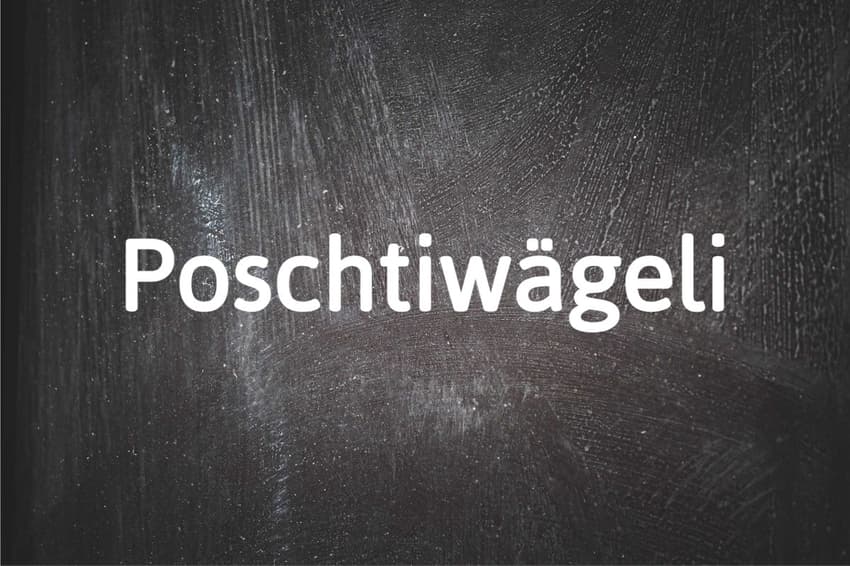Swiss German word of the day: Poschtiwägeli

If you're going shopping in Swiss-German speaking parts of Switzerland, this is a useful word to know.
Switzerland is a nation of many languages. Yes, there are the four official ones (Swiss German, French, Italian and Romansh) but there's also a lot variety within those.
For instance the various Swiss German dialects (also known as Schweizerdeutsch, Schwiizerdütsch and Schwyzerdütsch to name a few variations) are like languages in themselves.
READ ALSO: Swiss German vs Hochdeutsch - what are the key differences?
People in German-speaking areas in Switzerland (that includes the 17 Swiss German, three bilingual and one trilingual cantons) know standard German or Hochdeutsch but in everyday life people tend to speak a Swiss-German dialect.
Language experts recommend that people get familiar with the dialect in their local area so they can integrate better.
Today we're sharing a word we think is an important one to recognise in everyday Swiss life (at least in some areas): the noun das Poschtiwägeli.
When you hear Poschtiwägeli, you might think at first it has something to do with the Swiss Post-Auto bus service, but it has nothing to do with that.
It's an object that is part of daily life in Switzerland and means a trolley, shopping cart or a shopper.
Some Swiss German words are recognisable to speakers of standard German but this one might leave you perplexed.
That's because the high German word for a shopping trolley is Einkaufswagen.

A shopping trolley or Poschtiwägeli. Image by 652234 from Pixabay
While "Wägeli" is close to the German "Wagen", "Poschti" could perhaps be derived from the English "push". After all, a shopping trolley is pushed. However, it's not entirely clear where the term comes from.
Use it like this:
Swiss German: Für s Poschtiwägeli bruchemer en Zwoifränkler.
Standard German: Für den Einkaufswagen brauchen wir ein Zwei-Franken-Stück.
English: We need a two-franc piece for the trolley.
Comments (1)
See Also
Switzerland is a nation of many languages. Yes, there are the four official ones (Swiss German, French, Italian and Romansh) but there's also a lot variety within those.
For instance the various Swiss German dialects (also known as Schweizerdeutsch, Schwiizerdütsch and Schwyzerdütsch to name a few variations) are like languages in themselves.
READ ALSO: Swiss German vs Hochdeutsch - what are the key differences?
People in German-speaking areas in Switzerland (that includes the 17 Swiss German, three bilingual and one trilingual cantons) know standard German or Hochdeutsch but in everyday life people tend to speak a Swiss-German dialect.
Language experts recommend that people get familiar with the dialect in their local area so they can integrate better.
Today we're sharing a word we think is an important one to recognise in everyday Swiss life (at least in some areas): the noun das Poschtiwägeli.
When you hear Poschtiwägeli, you might think at first it has something to do with the Swiss Post-Auto bus service, but it has nothing to do with that.
It's an object that is part of daily life in Switzerland and means a trolley, shopping cart or a shopper.
Some Swiss German words are recognisable to speakers of standard German but this one might leave you perplexed.
That's because the high German word for a shopping trolley is Einkaufswagen.

While "Wägeli" is close to the German "Wagen", "Poschti" could perhaps be derived from the English "push". After all, a shopping trolley is pushed. However, it's not entirely clear where the term comes from.
Use it like this:
Swiss German: Für s Poschtiwägeli bruchemer en Zwoifränkler.
Standard German: Für den Einkaufswagen brauchen wir ein Zwei-Franken-Stück.
English: We need a two-franc piece for the trolley.
Join the conversation in our comments section below. Share your own views and experience and if you have a question or suggestion for our journalists then email us at [email protected].
Please keep comments civil, constructive and on topic – and make sure to read our terms of use before getting involved.
Please log in here to leave a comment.